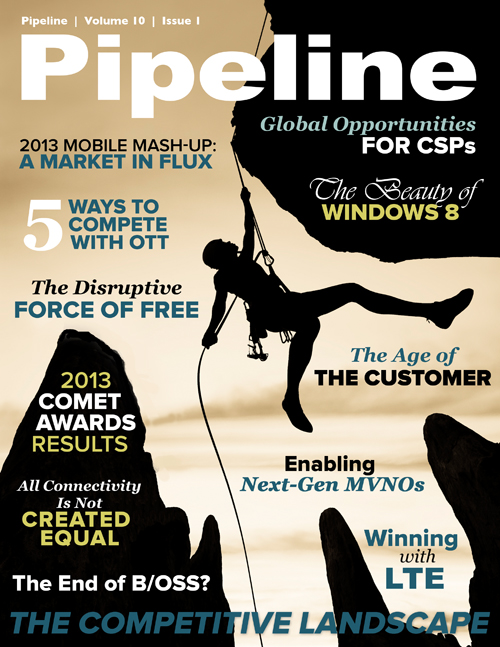Mobile Mash-up 2013: The Changing Competitive Landscape in the US
Sprint investors are keen on a merger of some sort, because even with its “truly unlimited” service plans, the third-place wireless provider is losing postpaid subscribers and struggling to hold its ground. Sprint’s board of directors supports SoftBank’s proposal, but there are two hurdles to overcome. First, the deal must pass a national security review—letting a Japanese company control a US operator’s network gives some regulators the heebie-jeebies—and when Pipeline went to press at the beginning of June, the FCC still hadn’t granted approval for foreign ownership. Second, satellite-based MSO Dish Network has made a large counteroffer for Sprint, igniting a bidding war.
Dish Network and everyone
Dish threw the market a curveball in April when it dug deep into its cash stash to bid $25.5 billion for Sprint, a cool $5 billion more than what SoftBank put on the table. Dish desperately wants to get into the mobile game so it can diversify its service offerings and move ahead of rival MSOs like DirecTV and Comcast, and it’s pulling out all the stops: late last month Dish paid for a series of newspaper ads that painted foreign ownership of US service providers’ networks in a negative light, and it launched nationalsecuritymatters.com, a website arguing that “the sale of wireless and wireline infrastructure with national strategic importance to a foreign company will weaken the security of the United States.” The site also plays on recent fears concerning network equipment manufacturer (NEM) Huawei, claiming, “SoftBank’s reliance on Chinese equipment manufacturers raises significant national security concerns.”
Desperate much? If it sounds like Dish Network chairman Charlie Ergen is staking everything on his company’s acquisition of Sprint, he is, or at least that’s the impression he gave on an investor conference call May 9, insinuating that he would consider putting Dish up for sale if the deal fell through. “If we’re unsuccessful with Sprint, obviously we have a lot of options,” he said. “It could include selling spectrum. It could include selling the whole company. It could include partnering with somebody else in the wireless business.”
For its part, SoftBank has promised to tear out $1 billion worth of Huawei gear from Sprint’s networks and maintain a high level of transparency with regulators if it’s awarded ownership of Sprint. Dish’s bid, however, represents a 13 percent premium to Sprint shareholders, and funding is already rolling in to support it.
Clearwire
In the middle of the Sprint-SoftBank-Dish Network soap opera is Clearwire, the Sprint-sponsored 4G provider that's quickly running out of cash. Its investors accepted a wholesale buyout bid from Sprint last December, but the bid was contingent on SoftBank's acquisition of Sprint. In walked Dish the following month with a higher bid for Clearwire, pitching an 11 percent premium over Sprint’s offer, before Sprint proposed a counteroffer in mid-May to rival Dish’s figure.
What’s special about Clearwire is its massive spectrum portfolio, spectrum that can be used for both cellular and ultrafast wireless data networks (think Wi-Fi on steroids). Clearwire owns the rights to a boatload of high-frequency 2.5 GHz spectrum, otherwise known as broadband radio service (BRS) spectrum, which is particularly good at shuttling data at very high speeds and can be used for both FD-LTE and TD-LTE networks. Clearwire has used it for its WiMAX service, and in fact owns more BRS spectrum than all of its competitors combined, hence the fervent interest of Sprint, Dish and even Verizon in recent months.
Smaller players on the chopping block
Struggling MNO U.S. Cellular recently sold its midwest operations and spectrum to Sprint, which meant its former customers in the region were forced to buy new phones. Sprint gained more than 400,000 new customers in the process, but once again the deal was really about spectrum: the CSP paid $480 million for those extra swaths of radio space, enabling it to augment its 4G coverage in Illinois, Indiana, Michigan, Missouri, and Ohio.
Leap Wireless, operating as Cricket, is also on the chopping block. After a meteoric initial rise, the prepaid carrier reached a plateau and is only now starting to roll out 4G LTE service, but at a pace that’s too slow for it to catch up with competitors unless it brings a partner on board, say analysts. The newly merged T-Mobile/MetroPCS has expressed interest in scooping up Cricket, and the same is true of Sprint, which has leased capacity to Leap Wireless for years.


















